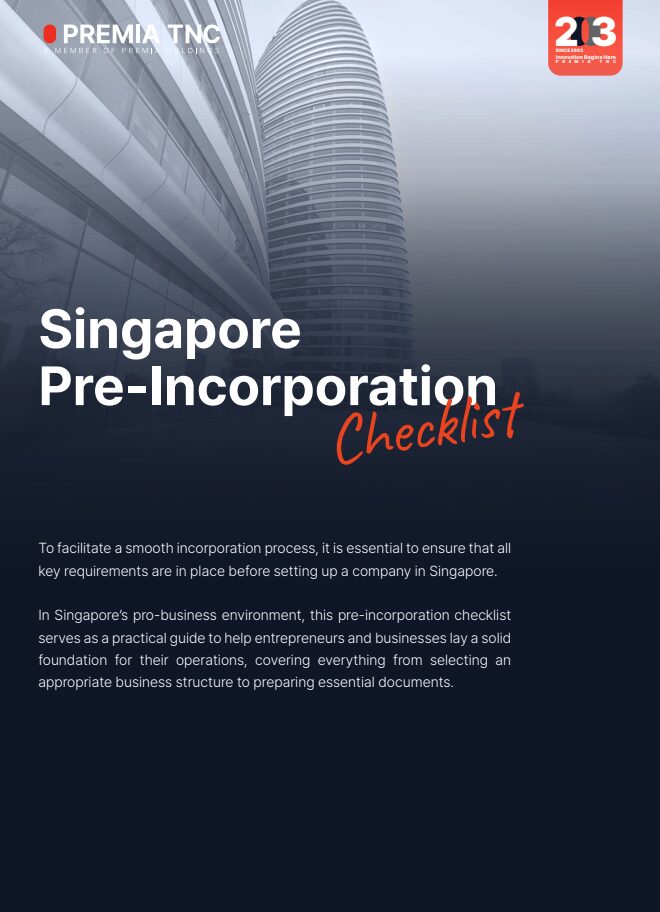

If you’ve studied the Asian market carefully for many years, you’ll be aware that Singapore is one of the best jurisdictions in the region. Many business owners – local or foreign – make their way to the country to take advantage of its resources and create a suitable environment for their businesses. While new local business owners may already be familiar with what it takes to open a local company, foreigners are likely to be unaware of many important things. Are you a foreigner who wishes to start a company in Singapore? This piece will show you how to open a local company in Singapore for foreigners.
More Foreign Companies are Expanding to Singapore
Singapore has a history of being a hub for foreign businesses that expand in the Asian market. An example of companies like this is One Space, a professional service company that wants to have an established presence in Singapore. This architecture and design firm has sent one of its founders, Greg Pearce, to the region to oversee local operations.
These foreign companies have identified the booming population in Singapore. As of 2022, there are almost 6 million people in Singapore, with a gross domestic product worth billions of dollars.

Why Is Singapore an Attractive Place for Foreigners to Do Business
Before we dive into opening a local company in Singapore, the first thing to review is why anyone would want to start their business in this country. As a foreigner in Singapore, you’ll enjoy the following when you open a company in Singapore:
Attractive Tax Policies
Singapore is known for its flexible tax rates, especially for new companies. Tax authorities in Singapore charge a 17% tax on company income. However, new companies can apply for tax exemptions and breaks to pay a considerably lesser amount. For instance, any new company with less than 20 shareholders can be exempted from up to $125,000 out of $200,000. Also, any company that doesn’t qualify for the startup exemption are eligible for a Partial Tax Exemption of up to $102,500 out of $200,000.
Access to Numerous Banking Facilities
There’s no shortage of banking facilities in Singapore with four local banks and over 100 foreign banks currently situated in this jurisdiction. Due to this competitive environment, business owners are bound to enjoy great deals, well-designed bank products, and suitable pricing models. Foreigners can use any of these banking solutions to boost their new business.
Foreign Ownership Policy
While most jurisdictions will try to stifle foreign ownership, Singapore does the opposite. This country has established legislation allowing local companies to enjoy 100% foreign ownership. Also, Singapore-based subsidiaries of larger companies can enjoy all the benefits of a Singapore incorporation.
Critical Requirements for Foreigners Setting Up Companies
Setting up a company in Singapore involves appointing a local director as this is a mandatory requirement in Singapore. The details of the director can be included when registering the company on the BizFile+ Portal.
The director is expected to be a person who is 18 years or older. Also, the person is expected to have total legal capacity. There are some options to consider when choosing a director. Foreigners may either choose a permanent resident, Singaporean, or EntrePass holder. It may also be a director nominated by the company. When you’re done choosing a director, foreigners must hire a registered filing company. This filing company will register the business on their behalf.
Restrictions For Foreigners Doing Business in Singapore
There are little or no restrictions on opening a business in Singapore. However, certain specific legislations must be adhered to, and their corresponding compliance filing requirements must be fulfilled. A foreign officer may also serve in the role of the director.
Business Entities Available For Foreigners in Singapore: Private Limited Company
A private limited company in Singapore, known as “Pte Ltd,” is a distinct legal entity with limited liability, accommodating up to 50 shareholders, including individuals and other companies. It offers advantages such as corporate tax exemptions and access to government initiatives for business expansion. Among Singapore’s business structures, Pte Ltd stands out as the most adaptable, sophisticated, and favored choice, surpassing limited liability partnership (LLP) and sole proprietorship (SP) due to its scalability and flexibility.
How To Open a Local Company in Singapore for Foreigners
If you’re a foreigner interested in starting a local company in Singapore, you’ll be able to choose from a subsidiary company, branch office, or representative office.
Subsidiary Office
Foreigners are likely to benefit more from setting up a subsidiary office. A subsidiary company is similar to a limited liability company. However, the subsidiary will be treated as a completely different entity from its parent company, even if the parent owns up to 100% of the shares in the company. The subsidiary will settle any liabilities and losses incurred during the fiscal year.
After creating a subsidiary company, the parent entity is expected to send one of its employees to take charge of operations. However, this person will need an employment pass to work in the country.
Branch Office
A foreign company can also choose to set up a branch office in Singapore. A branch office will only become a legal entity after registration, and this company will be an extension of the parent company. As a result, the parent company will be responsible for the debts and liabilities incurred by the branch office. The branch office is expected to hire at least one local authorised representative. In addition, the branch office is required to prepare an audited financial report for the annual return filing.
Representative Office
A representative office is a different type of company. Foreigners may set up a such a company in Singapore to research the region’s business potential. Their primary purpose is to carry out feasibility studies. This may come before further developments. A representative office does not have a separate legal identity from its parent company. It’s also not expected to have more than five employees and will not engage in profit-making.
The parent company of a representative office must have been in existence for at least three years. They are also expected to have an annual turnover of US$250,000. If the parent company gets dissolved, the representative office will be de-registered.

How to Open a Local Company in Singapore for Foreigners: Importance of a Registered Business Address
When opening a local company in Singapore, foreigners must secure a registered business address, a physical location within Singapore (not a P.O. Box). This is a legal requirement under Singapore law to ensure government agencies can send official correspondence, conduct inspections, and verify the company’s existence. The address will be publicly listed in ACRA’s records and used for all statutory communications.
Foreign entrepreneurs without a local presence can use commercial spaces or approved virtual office addresses that meet registration standards. Choosing a reputable address enhances credibility with clients, banks, and authorities and may also impact the company’s tax residency status. As such, selecting a compliant and strategic registered address should be a key priority during the incorporation process.
How to Open a Local Company in Singapore for Foreigners: Company Secretary and Paid-Up Capital Requirements
Foreigners looking to open a local company in Singapore must appoint a company secretary within six months of incorporation, as required by the Companies Act. The secretary must be a Singapore resident with the qualifications to handle key responsibilities such as maintaining statutory records, ensuring regulatory compliance, preparing board resolutions, and filing documents with ACRA. This role is especially important for foreign owners unfamiliar with local requirements, as the secretary ensures that the company stays compliant and avoids legal penalties.
Additionally, businesses must declare their paid-up capital during incorporation. The minimum requirement is just S$1 for private limited companies, making it easy for foreign entrepreneurs to get started. However, industries under specific regulatory bodies may require a higher capital amount to meet licensing conditions.
Additional Information For Foreigners To Register A Company in Singapore
Employment Pass (EP) Holders
Entrepreneurs establishing a company in Singapore are eligible to apply for an Employment Pass (EP) through the Ministry of Manpower (MOM). After approval, they can enter Singapore and commence work at their newly incorporated private limited company. It’s important to note that the EP application follows the incorporation of the Singapore business.
Incorporate Without Relocating
To open a company in Singapore, it’s essential to have a resident director or authorized representative. If you’re relocating, you’ll need relevant work visas; otherwise, you can appoint a local resident director. For foreigners unfamiliar with Singapore’s regulations, service providers can often provide assistance with business registration, providing options like nominee directors and local registered addresses.
How Can We Help?
The process of opening and registering a company in Singapore consists of several procedures. If you’re a foreigner interested in opening a local Singapore business, you’ll need to do so through a registered filing agent. At Premia TNC, a top-rated business consultancy firm, we understand everything it takes to register a business in Singapore. As such, we’ll be able to help you handle the process smoothly. Our experts will work hand in hand with you to achieve the desired results.

How to Open a Local Company in Singapore for Foreigners – Frequently Asked Questions
How quickly can I register a business in Singapore?
Business registration in Singapore is simple. All you have to do is submit your notarised documents and the required information. Once the necessary documents are signed, your company can be registered in 1 business day.
How much does it cost to incorporate a company in Singapore?
To incorporate a company in Singapore, besides the registered filing agent’s handling and service fees, you’ll need to settle ACRA fees – Company name application ($15) and registration fee ($300).
Why is a registered address for company incorporation mandatory in Singapore?
Foreigners registering a business in Singapore can use commercial or approved virtual office addresses, provided they meet registration standards. A registered business address must be a physical local address (not a P.O. Box), is legally required to receive official correspondence, facilitate inspections, and verify the company’s existence. This address appears in ACRA’s publicly available records. A reputable address also enhances credibility and may affect tax residency status.
What are the requirements for appointing a company secretary and declaring paid-up capital in Singapore?
To ensure compliance with statutory duties, companies in Singapore are legally required to appoint a qualified, Singapore-resident company secretary within six months of incorporation. Additionally, businesses must declare their paid-up capital during registration, starting from as little as S$1 for private limited companies. Certain industries may require higher capital to meet licensing rules.
What options do foreigners have to establish a business in Singapore?
Foreigners are allowed to establish a subsidiary, branch office, or representative office in Singapore to conduct business activities and expand their operations.
What makes Singapore an appealing location for foreigners to launch a business?
Singapore offers a low corporate tax rate of 17% with generous exemptions for new companies, allows 100% foreign ownership, and has a strong banking sector with over 100 local and foreign banks. These factors make it a highly favorable environment for foreign entrepreneurs.















